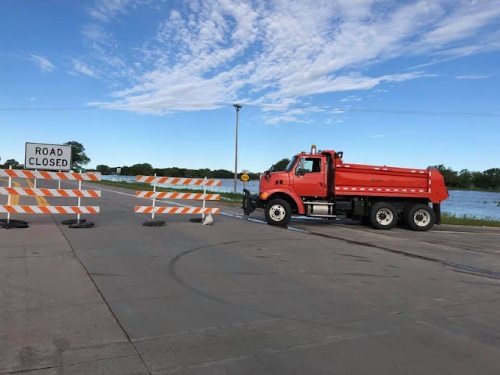The Kansas Department of Transportation recently received two awards for its stormwater management policies from the Water Environment Federation or WEF.
[Above photo by the Kansas DOT]
The agency received a bronze model for innovation and a silver medal for program management as part of WEF’s National Municipal Stormwater and Green Infrastructure Award contest.
“The quality of stormwater runoff is important to the health of our rivers, lakes, streams, and wetlands,” noted Dale Kirmer, a staff engineer with Kansas DOT, in a statement.
“Rainwater can pick up many different pollutants when it hits the ground and has no treatment facility,” he added. “It drains into our waterways through pipes and ditches. The pollutants can cause turbidity (i.e. cloudy water) and overgrowth of algae as well as harm aquatic organisms and the ecosystem.”
The Kansas DOT manages compliance within six areas of municipal separate storm sewer systems, also known as MS4, on state-owned right-of-ways statewide. As a result, the agency has developed an MS4 compliance strategy that promotes stormwater quality, optimizes processes, and looks for new opportunities to minimize impacts to stormwater runoff.
The agency’s stormwater management plan includes several interconnected compliance elements, such as promoting an Adopt-a-Highway litter removal program; creating comprehensive construction site runoff requirements for all Kansas DOT projects; and focusing on post-construction stormwater management, specific to the highway environment.
In the future, the agency plans to keep identifying opportunities to improve its documentation processes, among other items. The goal is not to only check a box, Kansas DOT stressed; the goal is to improve the quality of stormwater runoff from the state’s transportation systems.
Other state departments of transportation across the country are engaged in water-management efforts that mirror Kansas DOT’s stormwater control philosophies in many ways.
For example, as part of its “Let’s Change This to That” public education campaign, the California Department of Transportation began highlighting the top six sources of stormwater pollution across the state in May as well as ways to prevent them from contaminating California’s waterways.
Meanwhile, in August, the hydraulics unit of the North Carolina Department of Transportation won a 2022 Pelican Award from the North Carolina Coastal Federation for its efforts to both protect and improve coastal water quality. The Pelican Award honors volunteers, businesses, agencies, and organizations that go “above and beyond” to ensure a healthy North Carolina coast for future generations.
The Federation commended the NCDOT team – one of three winners of Pelican wards this year – for its dedicated advancement of nature-based resilience initiatives, such as its work on the living shoreline project along N.C. 24. That project is part of NCDOT’s effort to make more than 500 miles of coastal roads resilient to storms using nature-based solutions.
In May 2021, the Maryland Department of Transportation unveiled three “smart ponds” built via a public-private partnership or P3 stormwater control project that seeks to reduce pollutants and curb local flooding.
The agency said this “smart pond” project is the first of its kind involving a state transportation department and it involved the Maryland Department of Environment, Environmental Protection Agency, Walmart, and The Nature Conservancy. Overall, the Maryland DOT said it owns about 800 ponds that could benefit from this smart pond technology.
